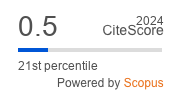Studies and research design in medicine
https://doi.org/10.47093/2218-7332.2021.12.1.4-17
摘要
Adequate design is an essential condition for conducting a successful study. This review describes the most common types of research design in medicine. We discuss the differences between different types of observational and interventional studies, their advantages and limitations providing examples for each study design. The concept of bias and its potential sources in different studies are covered. We suggest the most suitable approaches to study design for different research objectives and outline approaches to data presentation. During the last decades, several guidelines for conducting and reporting different types of research were proposed and they are also covered in this manuscript.
关于作者
N. Bulanov俄罗斯联邦
O. Blyuss
英国
D. Munblit
英国
N. Nekliudov
俄罗斯联邦
D. Butnaru
俄罗斯联邦
K. Kodzoeva
俄罗斯联邦
M. Nadinskaya
俄罗斯联邦
A. Zaikin
英国
参考
1. Süt N. How can we improve the quality of scientific research and publications? Guidelines for authors, editors, and reviewers. Balkan Med J. 2013; 30(2): 134–135. https://doi.org/10.5152/balkanmedj.2013.009 PMID: 25207088
2. Dhammi I.K., Rehan-Ul-Haq. Rejection of manuscripts: Problems and solutions. Indian J Orthop. 2018; 52(2): 97–99. https://doi.org/10.4103/ortho.IJOrtho_68_18 PMID: 29576635
3. Farrugia P., Petrisor B.A., Farrokhyar F., Bhandari M. Research questions, hypotheses and objectives. Can J Surg. 2010; 53(4): 278–281. PMID: 20646403
4. Smith J., Noble H. Bias in research. Evid Based Nurs. 2014; 17(4): 100–101. https://doi.org/10.1136/eb-2014-101946 PMID: 25097234
5. Schulz K.F., Grimes D.A. Sample size slippages in randomised trials: Exclusions and the lost and wayward. Lancet. 2002; 359(9308): 781–785. https://doi.org/10.1016/S0140-6736(02)07882-0 PMID: 11888606
6. Krieger N.S., Yao Z., Kyker-Snowman K., et al. Increased bone density in mice lacking the proton receptor OGR1. Kidney Int. 2016; 89(3): 565–573. https://doi.org/10.1016/j.kint.2015.12.020 PMID: 26880453
7. Röhrig B., Du Prel J.B., Wachtlin D., Blettner M. Types of study in medical research – Part 3 of a Series on Evaluation of Scientific Publications. Dtsch Arztebl Int. 2009; 106(15): 262–268. https://doi.org/10.3238/arztebl.2009.0262 PMID: 19547627
8. Du Sert N.P., Ahluwalia A., Alam S., et al. Reporting animal research: Explanation and elaboration for the arrive guidelines 2.0. PLoS Biol. 2020; 18(7): e3000411. https://doi.org/10.1371/journal.pbio.3000411 PMID: 32663221
9. Shaigany S., Gnirke M., Guttmann A., et al. An adult with Kawasaki-like multisystem inflammatory syndrome associated with COVID-19. Lancet. 2020; 396(10246): e8–10. https://doi.org/10.1016/S0140-6736(20)31526-9 PMID: 32659211
10. Centers for Disease Control. Pneumocystis Pneumonia – Los Angeles. Morb Mortal Wkly Rep. 1981; 30(21): 250–252. PMID: 6265753
11. Riley D.S., Barber M.S., Kienle G.S., et al. CARE guidelines for case reports: explanation and elaboration document. J Clin Epidemiol. 2017; 89: 218–235. https://doi.org/10.1016/j.jclinepi.2017.04.026 PMID: 28529185
12. Mokdad A.H., Ford E.S., Bowman B.A., et al. Prevalence of obesity, diabetes, and obesity-related health risk factors, 2001. JAMA. 2003; 289(1): 76–79. https://doi.org/10.1001/jama.289.1.76 PMID: 12503980
13. Setia M.S. Methodology series module 3: Cross-sectional studies. Indian J Dermatol. 2016; 61(3): 261–264. https://doi.org/10.4103/0019-5154.182410 PMID: 27293245
14. Richter T., Nestler-Parr S., Babela R., et al. Rare disease terminology and definitions-a systematic global review: report of the ISPOR rare disease special interest group. Value Heal. 2015; 18(6): 906–914. https://doi.org/10.1016/j.jval.2015.05.008 PMID: 26409619
15. Von Elm E., Altman D.G., Egger M., et al. The Strengthening the Reporting of Observational Studies in Epidemiology (STROBE) statement: Guidelines for reporting observational studies. PLoS Med. 2007; 4(10): 1623–1627. https://doi.org/10.1371/journal.pmed.0040296 PMID: 17941714
16. Shaposhnikov D., Revich B., Bellander T., et al. Mortality related to air pollution with the Moscow heat wave and wildfire of 2010. Epidemiology. 2014; 25(3): 359–364. https://doi.org/10.1097/EDE.0000000000000090 PMID: 24598414
17. D’Souza G., Kreimer A.R., Viscidi R., et al. Case–control study of human papillomavirus and oropharyngeal cancer. N Engl J Med. 2007; 356(19): 1944–1956. https://doi.org/10.1056/NEJMoa065497 PMID: 17494927
18. Bossuyt P.M., Reitsma J.B., Bruns D.E., et al. STARD 2015: An updated list of essential items for reporting diagnostic accuracy studies. BMJ. 2015; 351: h5527. https://doi.org/10.1136/bmj.h5527 PMID: 26511519
19. Rico-Campà A., Martínez-González M.A., Alvarez-Alvarez I., et al. Association between consumption of ultra-processed foods and all cause mortality: SUN prospective cohort study. BMJ. 2019; 365: l1949. https://doi.org/10.1136/bmj.l1949 PMID: 31142450
20. De Blok C.J.M., Wiepjes C.M., Nota N.M., et al. Breast cancer risk in transgender people receiving hormone treatment: Nationwide cohort study in the Netherlands. BMJ. 2019; 365: l1652. https://doi.org/10.1136/bmj.l1652 PMID: 31088823
21. Chauhan K., Pandey A., Thakuria B. Hand hygiene: An educational intervention targeting grass root level. J Infect Public Health. 2019; 12(3): 419–423. https://doi.org/10.1016/j.jiph.2018.12.014 PMID: 30679038
22. Agusti A., Guillen E., Ayora A., et al. Efficacy and safety of hydroxychloroquine in healthcare professionals with mild SARS-CoV-2 infection: Prospective, non-randomized trial. Enferm Infecc Microbiol Clin. 2020; S0213-005X(20)30413-4. https://doi.org/10.1016/j.eimc.2020.10.023 PMID: 33413989
23. Wiviott S.D., Raz I., Bonaca M.P., et al. Dapagliflozin and cardiovascular outcomes in type 2 diabetes. N Engl J Med. 2019; 380(4): 347–357. https://doi.org/10.1056/NEJMoa1812389 PMID: 30415602
24. Moher D., Hopewell S., Schulz K.F., et al. CONSORT 2010 explanation and elaboration: updated guidelines for reporting parallel group randomised trials. BMJ. 2010; 340: c869. https://doi.org/10.1136/bmj.c869 PMID: 20332511
25. Coughlin S.S., Young L. Social determinants of myocardial infarction risk and survival: A systematic review. Eur J Cardiovasc Res. 2020; 1(1): 1–12. https://doi.org/10.31487/j.ejcr.2020.01.02 PMID: 33089252
26. Wang B., Luo Q., Zhang W., et al. The involvement of chronic kidney disease and acute kidney injury in disease severity and mortality in patients with COVID-19: A meta-analysis. Kidney Blood Press Res. 2021; 46(1): 17–30. https://doi.org/10.1159/000512211 PMID: 33352576
27. Moher D., Liberati A., Tetzlaff J., et al. Preferred reporting items for systematic reviews and meta-analyses: The PRISMA statement. PLoS Med. 2009; 6(7): e1000097. https://doi.org/10.1371/journal.pmed.1000097 PMID: 19621072
28. Kirkwood B., Stern J. Essential Medical Statistics. 2nd ed. Blackwell Publishing; 2003; 512 p.
29. Gallin J., Ognibene F., Johnson L. Principles and practice of clinical research. 4th ed. Elsevier; 2017; 824 p. eBook







































